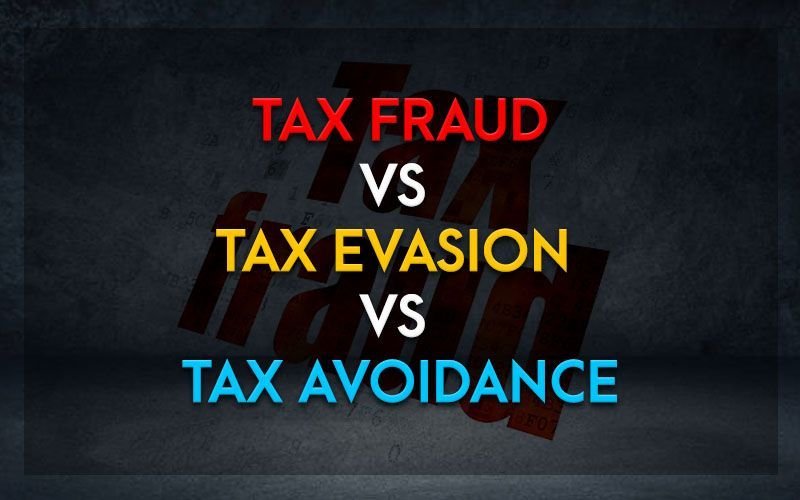Tax evasion, tax avoidance, and tax fraud are all words that can be used interchangeably but have different meanings. One of these is legal while the other is not.
Individuals and businesses that commit tax fraud and intentionally evade taxes can get into big trouble with the Internal Revenue Service. Individuals and businesses are allowed to avoid paying taxes with the help of his or her tax advisor.
Tax Fraud
Tax Fraud is an illegal intentional attempt to evade tax laws or defraud the IRS. It is a general term with various meanings and is very hard to prove because the government doesn’t have proof that the taxpayer knowingly cheated the government out of tax revenue.
Examples that considered as tax fraud:
1. Intentionally failing to file an income tax return
2. Failing to pay taxes due
3. Failing to report all income received
4. Making false claims
5. Preparing and filing a false tax return
6. Overstating deductions and exemptions
7. Falsifying documents
8. Using fake Social Security Number (SSN)
9. Keeping two sets of financial ledgers
10. Claiming a non-existent dependent exemption
Adding on to these examples, there are also employment tax frauds such as employer failing to withhold federal income tax from employee paychecks, hiring an outside payroll service that doesn’t give the funds to the IRS, and paying employees in cash and not reporting the cash payments.
Tax Evasion
Tax Evasion is the illegal nonpayment or underpayment of tax by not reporting income, reporting expenses that are illegal, or by not paying taxes owed to the IRS.
It is a subset of tax fraud meaning that some things that are considered tax evasion can also classify as tax fraud and the examples of both fraud and evasion are basically the same.
If you pay attention to the news, you’d often associate tax evasion with wealthy celebrities and corporations, but don’t be fooled. Low and middle-income earners have also been known to do it as well.
Examples that considered as Tax Evasion
1. Knowingly fail to report income
2. Claiming less income than you actually received from a specific source
3. Providing false information to the IRS about your business income or expenses
4. Intentionally underpaying taxes owed
5. Claiming a tax amount on your return which is less than the amount owed on the income you reported
Tax Avoidance
Although Tax Avoidance is a legal practice, taxpayers must follow state tax laws properly, otherwise, it can become just as illegal as the other two mentioned earlier.
Common examples that considered as tax avoidance:
1. Establishing a tax-deferred plan to delay taxes until a later date such as an IRA, SEP-IRA, or 401(k)
2. Taking legitimate tax deductions to minimize business expenses that result in the reduction of the tax bills
3. Take the tax credits offered by the IRS to spend money for valid purposes like taking a Work Opportunity Tax Credit for hiring workers in your business.
Penalties:
While tax fraud and tax evasion are illegal practices that can result in years of jail and thousands of dollars in penalties. Tax avoidance is a practice that is legal and uses methods approved by the IRS to minimize taxes.
The IRS may review minor tax evasion cases in tax court, but send most of the other cases to the IRS criminal division for trial.
The IRS can bring criminal charges to those who have been caught with tax fraud/tax evasion, and even if the taxpayer is found innocent, the costs in time and money are not worth even having thoughts about avoiding taxes. Penalties can range from jail time for about 5 years to paying hundreds and thousands of dollars, or both.
Always make sure that you file your taxes on time and pay what you owe to the IRS within a reasonable time or figure out other legal ways to get tax relief from your tax advisor.







